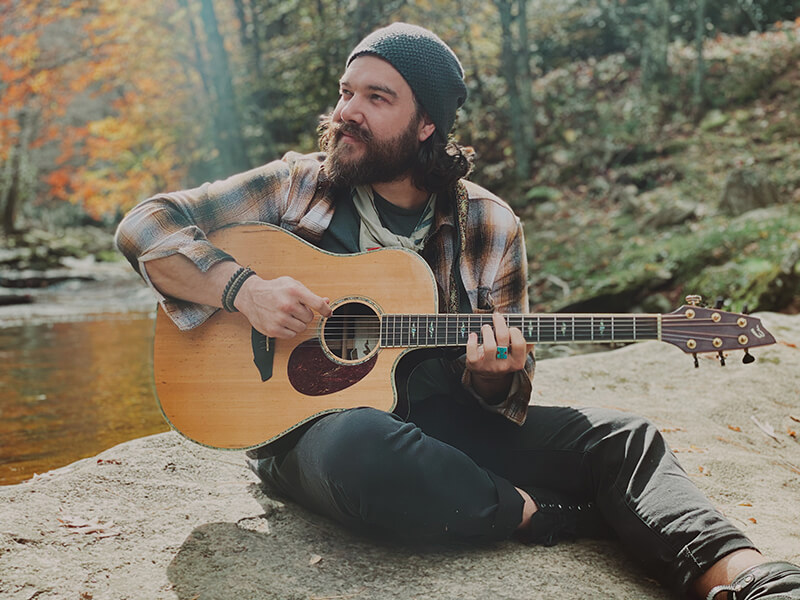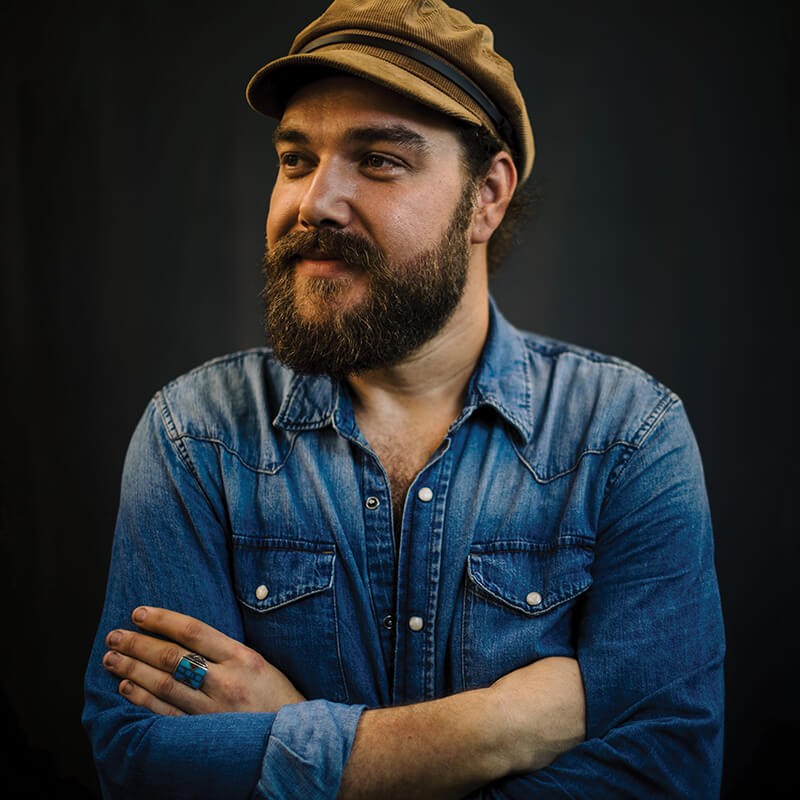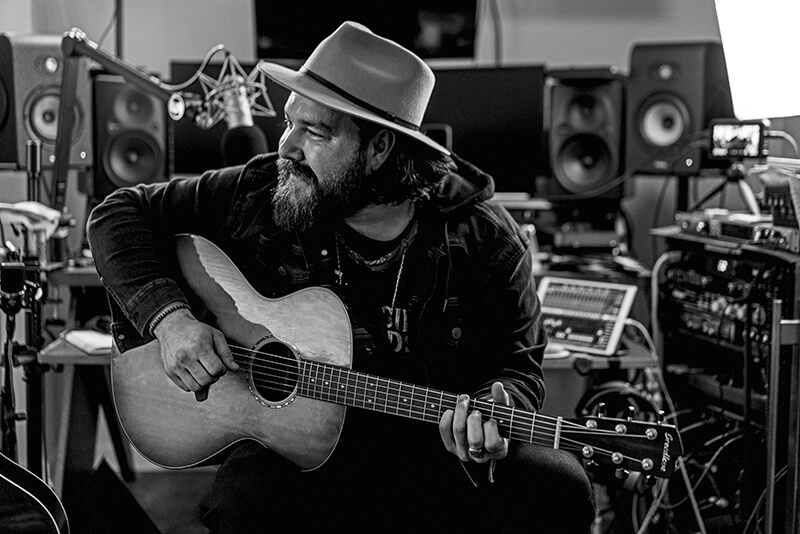Travis Shallow has been building a budding community of listeners with his down-home, relatable livestreams these past few years.
The Southern singer, songwriter, and guitarist sat down with us to chat about his upbringing, his approach to the business, and how livestreaming helped boost his career.
So, let’s take it back to the beginning. I know that you’re originally from North Carolina. Could you maybe give us a little bit of insight into your background and where music entered the picture for you?
I grew up in Greenville, NC about two hours north of where I am now, which is Wilmington, Wilmington been home base for me since 2000. But growing up, I started with some Suzuki violin type stuff, a couple piano lessons here and there. Nothing stuck; the violin felt more like a chore.
So, like I said…nothing stuck, but I would say that that’s where the ear training stuff that I learned became very valuable later on in life. So that was kind of the initial thing, but once I moved to Wilmington it was kind of a mess.
I think just being a musician in general, that’s a superpower all to itself, not with just the music side, but the promoting side. All the business things that no musician signed up to do. There’s a definite value to learning patience, especially when we gotta deal with the business angle all the time.
Going back to your roots, were you primarily acoustic at the beginning or were you mixing electric in at that point, as well?
Acoustic, mainly. My folks had a used Ovation guitar, which I still have. I actually I just bought another house and we’ve been in the process of moving – so, I’m digging out old closets and old gear and moving stuff over and I found this old guitar and I took it out of the case and started to try to play it. And I’m like how did I ever play this? You know, the action’s an inch off the board. [laughs]
It just shows you how into it you were back then.
It was kind of inspiring to take it out of case because you just wanted to learn at all costs. Whatever it took, whatever you had, you were gonna make some noise with it. It’s crazy looking back for me again.
I think it’s wonderful that you can go into a guitar shop now and get a $200 Squier off the rack and it’s 10 times better than what we started out on.
Right? My brother had an electric guitar, a cherry red Les Paul that was like forbidden to even look at. You know what I mean? We’ve got a four-year age gap, which is, you know now doesn’t seem like anything, but when you’re 14 that’s a massive gap. When you’re the younger brother, all you really want to do is just, you know, hang out with your older brother or you’re into whatever they’re doing. So, he turned me on to a lot of great music — I wouldn’t say actively turned me on to it, but I was always listening from afar.
And then when they would leave, you sneak into the room. Find the records, crack open that cherry red Les Paul case…but even back then I loved the power of the electric guitar but was always more gravitating towards the acoustic guitar. Now looking back, I think it was because songwriters were kind of the beacon for me. I was never really drawn to, you know, flashy lead guitar players.
I loved all that music, don’t get me wrong. All that Led Zeppelin stuff, but it was the songs that [spoke to me].
And that makes sense. I mean, you come from part of the country where songwriting is king. You said that you moved in 2002. Was that for musical reasons or you were just kind of getting out of the house?
Just getting out of the hometown. Greenville was a college town where East Carolina University is, but it’s like it’s landlocked. We’re about two hours from the coast there and it just kind of ran its course for me. My brother was already in in Wilmington and since I didn’t really get into a college, I just packed up my car and moved straight down. I started taking some music classes at the Community College here, yeah, but you know how it was. They’re very entry level stuff.

Were you thinking at that time, “I just need to get out of the house” or were you thinking that you were going to go into music full-time being that you weren’t going to go to college?
My plan was this: I’m leaving Greenville, I’m gonna move where my older brother is. And he was basically living in little shack on Wrightsville Beach, which is kind of the beach attached to Wilmington. And I’m gonna figure this music thing out. The goal was to just perform for a living.
And looking back, it was almost delusional to think that that that was the game plan. But within that delusion is kind of just what ended up happening. You know, there was really no Plan B.
I had just kind of networked enough to get that first gig, and you know, back then you still kind of had to have a demo and you’d drop off a demo to [a club]. But I mean, I don’t even think I had an e-mail address back then. A lot of the business used to be done over the phone, which I don’t think a lot of people remember, you know?
There was a place on the beach called the Palm Room and it was a great beach bar, great live bands at night. The guy that was supposed to play that night didn’t show up. I was in the bar there and I lived two streets away, and they said, “Look, if you want to play tonight, the guy didn’t show up.” I went back and got the guitar. I think I was, you know, 18 or 19. Got the guitar, came back and played the whole night and then all of our friends were there and that was the first gig. The first one. And every gig I’ve gotten since then all came from that one.
I kind of bypassed having to have that demo in hand. [laughs]
It sounds like it was almost meant to be. Were you starting to write at that point, doing original stuff?
Yeah, I was already writing, but I would guess those first few gigs were probably 80% covers, for sure.
I kind of saw the writing on the wall, there’s a ceiling here of some of these, like kind of beach bar gigs, bar band type stuff, and there’s two routes you can go. You can either do the cover band thing and throw in an original here and there. And just kind of do that circuit around the Carolinas, or even the southeast. I know a lot of guys that do that.
But there’s a ceiling, you know, so you try to be dedicated to doing your own music and trying to find the right venues that nurture original music and try to piece it together.
But those first few years of doing it full time, I kind of dabbled back and forth between those two roads until I finally just said, look, I’m just gonna write my own music, make records, and that’s it.
I hear this from a lot of people who have similar stories — they run the cover band circuit for a while and it’s just like, “I’ve got my own voice.”
I’ve got to do this now before it, you know, bursts out of me something. [laughs]
You know, I just never really got off playing other people’s music for people. If I’m going to see live music, I want to see what that person has to offer.
How have things been treating you since the pandemic started?
Once the pandemic hit in in March of 2020, yeah, I kind of saw the writing on the wall and I set up this live stream [situation] and was doing pretty good with that for a while. I’m still doing a version of it.
I’ve always had some version of a home studio, and in the last five or six years I’ve really upgraded the [space], which was good because the rug got pulled and all tours were cancelled. All shows were canceled.

It’s funny ’cause I’m sure you remember like every single person that knows how to play the guitar was live streaming on the Internet.
But there were some really talented friends of mine, great songwriter friends of mine that were live streaming that I know personally, that sound amazing live but sounded awful on the live stream. Just ’cause they maybe didn’t have technical side of it figured out, you know, the phone, the bandwidth and this and that — so kind of early on I said OK, I see the value in the live stream and for my own mental health I need some structure – to do something.
I said maybe I could take the studio microphones and this little nicer camera that me and my girl had bought together…that was just getting dusty on the shelf. Maybe I could take that and make something that looks and sounds more like a [real] show, yeah?
I slowly started building an online community because I mean I was active on social media but not really, but pretty quickly the audience started to grow week by week, kind of as more and more people started tuning in. And then I started blasting out to the Internet on all the platforms at once and I was doing it twice a week, Wednesdays and Saturdays at 6:00 PM Eastern. Man, I just really built a community around it and I’d keep it pretty loose — as in, I’m just going to sit down and play songs that are on my mind and on my heart, and that that was the benchmark.
There was nothing more to it, it grew very organically.
Where are you at now in your personal career? Are you doing strictly solo recordings or you doing a band line up?
So right now is mainly solo stuff, you know? The last record I put out was a full band record that was under the band name Travis Shallow and the Deep End and that was a record called the Great Divide which we recorded in in Durham, NC. Those guys are still…I wouldn’t say ‘on call’ but…they’re at the ready. They’re great session guys, and they’re great old friends as well. Very talented.
But I just got kind of burnt out on the full band thing and all the travel, so I stripped it back down to a lot of solo stuff and then a lot of duo stuff.
So, the things I’m working on now, I’ve got a single that’s coming out and we’re gearing up for a busy summer and it’s just like…things are all over the place, but basically what I wanted to do while I did all this live stream [stuff] during the pandemic was to multitrack every [show].

That’s smart.
I didn’t really know exactly why, but I’m just big on documenting [everything]. Well, after 165 episodes there were some moments throughout that are just great highlight performances from these past episodes. I mixed and mastered them myself, and kind of just as a thank you to people that have tuned in, I’m gonna do a digital release called “Live From Shallow Chateau Volume One.”
But I’m still doing the live stream every Wednesday. And I started to get out live again. Basically, I did a run through South Carolina, Georgia and Tennessee in seated listening rooms. That was [last] September when I did the first one. These were all indoor shows, and I don’t think people were quite ready to sit side-by-side indoors, even in September of last year.
I mean, that was still Delta… but I’m glad I did it ’cause it was a good litmus test to go back and just be in front of people. But there were half filled rooms — there was no way around it. People just weren’t quite ready. But then I said OK, until I get the full green light I’m glad I did these runs, but let me just go back, focus on this live album and some studio recordings and then gear up for a busy summer. Which is where I’m at now…
Follow in Instagram at @travisshallow
Photos by Erika Arlee
